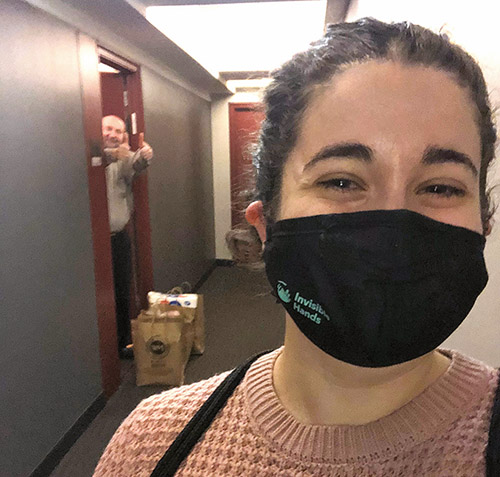
On a recent afternoon, Lisa Appelbaum found herself at the local supermarket checking out 43 cans of food—15 garbanzo beans, 10 cream of mushroom soups, and 18 sliced carrots, to be exact. Appelbaum doesn’t have a particular taste for canned food, but she does have a craving for volunteer work.
Appelbaum is one of the many young professionals on Manhattan’s Upper West Side passionate about chesed. Appelbaum, who grew up in Teaneck, moved from her last home in Albany, N.Y., to New York City at the beginning of March for her job in shipping and logistics. After four days of working in person, the position transitioned to remote.
The craziness of the pandemic, and her working from home, afforded Appelbaum the time to pursue volunteer opportunities. Through a variety of groups, including an Upper West Side Jews WhatsApp group, Appelbaum learned about Invisible Hands. The nonprofit organization, founded in March, delivers food, medicine and other essentials to those in need or at-risk, including the elderly, immunocompromised and those who are food insecure.
Volunteers organize through Slack, a digital workplace communication app, to fulfill orders sent in through the Invisible Hands website. Once a volunteer takes on an order, they confirm the order with the recipient, head to the grocery store or pharmacy, and shop for the person. Afterward, volunteers drop off the order by the recipient’s door and let them know the order arrived.
Appelbaum began volunteering with Invisible Hands in September and takes on roughly one to five orders a week. Depending on the order and size and location of the store, the process takes anywhere from 30 minutes to nearly two hours. In the beginning of Appelbaum’s service with the organization, she brought her own reusable bags to complete orders. Noting the city’s new plastic bag ban, she thought, “Let’s save the environment!” However, she no longer uses reusable bags—the wait for recipients to empty out the items and return the bags slowed down the overall delivery process.
Appelbaum’s passion for volunteering stems from her time at Binghamton University. At Binghamton, she volunteered with Challah for Hunger and as an eruv checker. “I wanted to feel like I was a member of the community, not just there for school,” she explained. Appelbaum continues to seek out volunteer opportunities wherever she goes.
Ellie Selevan, like Appelbaum, is an avid volunteer. Selevan moved to the Upper West Side two years ago but grew up in a small community outside Toronto. “I grew up in a small town where you have this feeling that every person matters,” she said. With this mindset, she spends her time volunteering at an array of organizations in the area, whether it’s computer tutoring for the elderly or packaging food with Chabad. She especially enjoys volunteering with Dorot, an organization that works to curb social isolation for older Jewish people. In pre-COVID times, Dorot volunteers visited older people, and brought balloons and cake on birthdays to ensure these celebrations weren’t celebrated alone. Though these in-person visits have temporarily stopped, volunteers now provide company through phone calls and virtual platforms.
Similarly, Bradley Goldman cares deeply about his community. His day job as an auditor does not outshine his work as the founder of Warm the West Side, a nonprofit that provides blankets, gloves and socks to New York City’s homeless. Goldman launched the organization on Giving Tuesday in early December.
“I felt it was important, with only a month left of the year, for something positive to happen in 2020,” said Goldman.
Throughout the pandemic, Goldman noticed organizations struggling, both with finances and changing restrictions on space and donation guidelines. With an understanding of the new rules, Goldman, with the help of generous donors, founded Warm the West Side, which provides a variety of winter apparel to homeless shelters. Purchased directly from vendors, all items ship to Goldman’s Upper West Side apartment. From there, Goldman delivers the items to the shelters. Luckily, he has a strong network of family and friends to help, whether it be with social media, finding reasonably priced and high quality vendors, or connecting the organization with strategic partners.
Goldman’s inspiration came from the many organizations he saw helping others during COVID. He also cited his former Jewish day school, Reuben Gittelman Hebrew Day School (formerly the Solomon Schechter School of Rockland County), as a place that taught him to be the best person he could be. His time at Solomon Schechter in Westchester (now the Leffell School) and at Binghamton University further cemented these values.
“There’s a saying that it’s not our job to fix the world. But it’s not our job to ignore it, either.” Goldman hopes that Warm the West Side is a small step to building a better world.
By Ayelet Ehrenkranz










